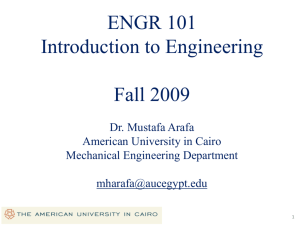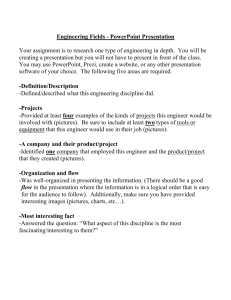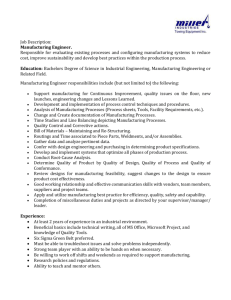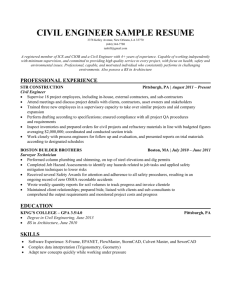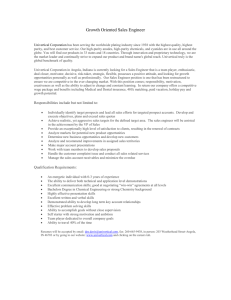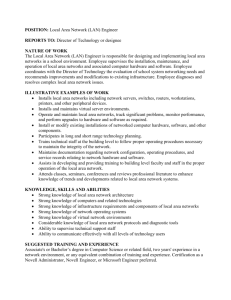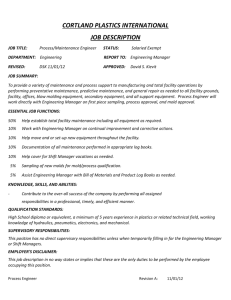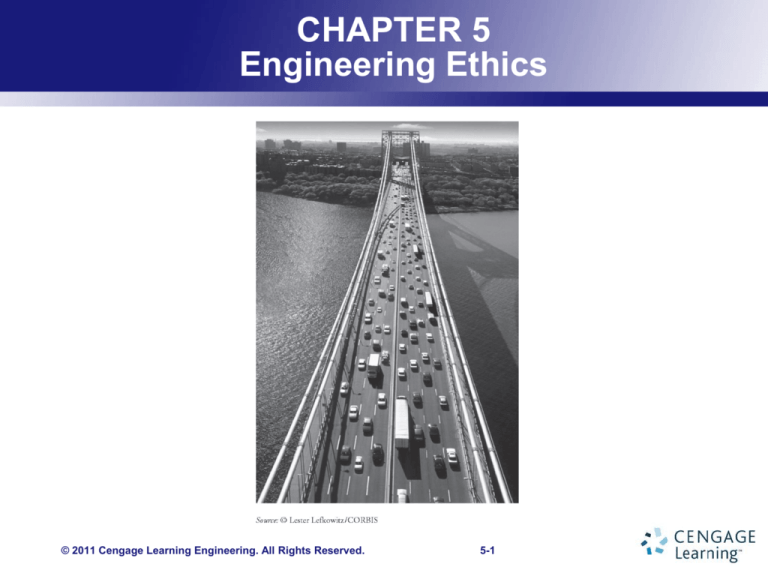
CHAPTER 5
Engineering Ethics
© 2011 Cengage Learning Engineering. All Rights Reserved.
5-1
Engineering – An Exciting Profession
• Introduction to engineering profession
• Preparing for an engineering career
• Introduction to engineering design
• Engineering communication
• Engineering Ethics
© 2011 Cengage Learning Engineering. All Rights Reserved.
5-2
Outline
In this chapter we will
• Describe the Code of Ethics of the National
Society of Professional Engineers
• Describe the Engineer’s Creed
• Describe additional ethical definitions
• Study some ethics cases
© 2011 Cengage Learning Engineering. All Rights Reserved.
5-3
Objectives
The objectives of this chapter is to
• Emphasize the importance of ethics in
engineering profession
• Introduce the National Society of Professional
Engineers (NSPE) code of ethics
© 2011 Cengage Learning Engineering. All Rights Reserved.
5-4
Why Is Ethics Important?
• People rely heavily on engineers to provide
them with safe and reliable goods and services
• Engineers must perform under a certain
standard of professional behavior which requires
adherence to the highest principles of ethical
conduct
• Mistakes made by unethical and/or incompetent
engineers do not just cost money, they could
cost many lives.
© 2011 Cengage Learning Engineering. All Rights Reserved.
5-5
Ethics
Study of morality and the moral
choices that we all have to make
in our lives
© 2011 Cengage Learning Engineering. All Rights Reserved.
5-6
Ethics – Definition
The study of the general nature of
morals and of specific moral choices
The rules or standards governing the
conduct of the members of a
profession
American Heritage
© 2011 Cengage Learning Engineering. All Rights Reserved.
5-7
Ethics - NSPE
National Society of Professional
Engineers (NSPE) Code of Ethics for
Engineers
http://www.nspe.org/Ethics/CodeofEthics/index.html
© 2011 Cengage Learning Engineering. All Rights Reserved.
5-8
NSPE Code of Ethics for Engineers
designed to provide positive stimulus for
ethical conduct as well as helpful
guidance and advice concerning the
primary and basic obligations of
engineers. The Code also establishes the
ethical guideposts for the NSPE Board of
Ethical Review in interpreting ethical
dilemmas submitted by engineers, public
officials, and members of the public.
© 2011 Cengage Learning Engineering. All Rights Reserved.
5-9
Preamble
Engineering is an important and learned
profession. As members of this profession,
engineers are expected to exhibit the highest
standards of honesty & integrity. Engineering has
a direct & vital impact on the quality of life for all
people. Accordingly, the services provided by
engineers require honesty, impartiality, fairness &
equity, & must be dedicated to the protection of the
public health, safety, and welfare. Engineers must
perform under a standard of professional behavior
that requires adherence to the highest principles of
ethical conduct.
© 2011 Cengage Learning Engineering. All Rights Reserved.
5-10
Fundamental Canons
Engineers, in the fulfillment of their
professional duties, shall:
1. Hold paramount the safety, health and welfare
of the public.
2. Perform services only in areas of their
competence.
3. Issue public statements only in an objective
and truthful manner.
© 2011 Cengage Learning Engineering. All Rights Reserved.
5-11
Fundamental Canons (continued)
4. Act for each employer or client as faithful
agents or trustees.
5. Avoid deceptive acts.
6. Conduct themselves honorably, responsibly,
ethically, and lawfully so as to enhance the
honor, reputation, and usefulness of the
profession.
© 2011 Cengage Learning Engineering. All Rights Reserved.
5-12
Engineer’s Creed
• Approved in June 1954
• Short statement of philosophy of service
• Used in ceremonies or in recognition of
individuals
• Used widely in NSPE, state society, and local
chapter officer installation ceremonies,
licensure certificate presentations, and
engineering school graduations.
© 2011 Cengage Learning Engineering. All Rights Reserved.
5-13
Engineer’s Creed (continued)
• To give the utmost of performance;
• To participate in none but honest enterprise;
• To live and work according to the laws of man and the
highest standards of professional conduct;
• To place
service before profit,
the honor and standing of the profession before
personal advantage, and
the public welfare above all other considerations.
In humility and with need for Divine Guidance, I make
this pledge.
Adopted by NSPE, June 1954
© 2011 Cengage Learning Engineering. All Rights Reserved.
5-14
Additional Definition
• Academic dishonesty
• Plagiarism
• Conflict of interest
• Contract
• Professional responsibility
© 2011 Cengage Learning Engineering. All Rights Reserved.
5-15
Ethics Case Studies
• Milton E. Lunch Ethics Contest Cases
• Be your judge – Board of Ethical Review
(BER) cases
© 2011 Cengage Learning Engineering. All Rights Reserved.
5-16
2002 Milton F. Lunch Ethics Contest
Facts:
Engineer A is a graduating senior with excellent
credentials from X University. Engineer A has had a
series of job interviews with engineering companies from
around the U.S. Following interviews with several
industrial companies, Engineer A decides to accept an
offer with ABC Incorporated located in his hometown of
Townville and plans to notify ABC the following week. In
the interim period, Engineer A receives a call from
Engineer B, an executive with XYZ Incorporated, a
potential employer with whom Engineer A interviewed . . .
© 2011 Cengage Learning Engineering. All Rights Reserved.
5-17
2002 Milton F. Lunch Ethics Contest
(continued)
Facts (continued):
On behalf of XYZ, Engineer B offers Engineer A (at
XYZ’s expense) a chance to visit XYZ’s headquarters in
Mountainville, a city located near a resort area following
Engineer A’s graduation. Engineer A had earlier decided
he would not accept a position with XYZ if offered a
position by ABC, because Engineer A wanted to live near
Townville to be close to family and friends, and also
because ABC provided better long-term professional
opportunities . . .
© 2011 Cengage Learning Engineering. All Rights Reserved.
5-18
2002 Milton F. Lunch Ethics Contest
(continued)
Facts (continued):
However, after receiving the call from XYZ, Engineer A
decides to accept the invitation to visit XYZ's
headquarters and combine the trip with a postgraduation vacation, believing that the visit to XYZ will
broaden Engineer A’s knowledge of the employment
market, as well as future professional opportunities with
XYZ. A week after the trip, Engineer A calls ABC and
informs the company that he will accept the position with
ABC.
© 2011 Cengage Learning Engineering. All Rights Reserved.
5-19
2002 Milton F. Lunch Ethics Contest
(continued)
Question:
Was it ethical for Engineer A to accept the
invitation to visit XYZ headquarters?
© 2011 Cengage Learning Engineering. All Rights Reserved.
5-20
2003 Milton F. Lunch Ethics Contest
Facts:
Individual A is involved in a vehicular accident during
which another individual, Individual B, is killed. During
the police investigation, the police determined and
recommended to prosecutors that the matter should be
converted from a civil matter to a criminal prosecution,
and Individual A is charged with homicide. As part of the
prosecutor’s investigation, the prosecutor (Prosecutor C)
retains Engineer D (an engineering expert) to review the
record and provide a supporting forensic report and
testimony in the prosecution of Individual A . . .
© 2011 Cengage Learning Engineering. All Rights Reserved.
5-21
2003 Milton F. Lunch Ethics Contest
(continued)
Facts (continued):
Following Engineer D’s extensive review of the record,
Engineer D finds technical evidence to demonstrate that
the cause of the accident was non-criminal and
determines that he cannot support the prosecution’s
theory that Individual A’s actions support a criminal
prosecution. Learning of Engineer D’s determination,
Prosecutor C continues the prosecution of Individual A,
and does not call Engineer D as a witness at trial. The
trial ends in a hung jury, and the case is expected to be
retried in the near future.
© 2011 Cengage Learning Engineering. All Rights Reserved.
5-22
2003 Milton F. Lunch Ethics Contest
(continued)
Question:
What are Engineer D’s ethical obligations under the facts
and circumstances?
© 2011 Cengage Learning Engineering. All Rights Reserved.
5-23
Confidentiality of Engineering Report:
Case No. 82-2
Facts:
Engineer A offers a home owner inspection service,
whereby he undertakes to perform an engineering
inspection of residences by prospective purchaser.
Engineer A performed this service for a client (husband
and wife) for a fee and prepared a one-page written
report, concluding that the residence under
consideration was in generally good condition requiring
no major repairs, but noting several minor items needing
attention . . .
© 2011 Cengage Learning Engineering. All Rights Reserved.
5-24
Confidentiality of Engineering Report:
Case No. 82-2 (continued)
Facts (continued):
Engineer A submitted his report to the client showing that
a carbon copy was sent to the real estate firm handling
the sale of the residence. The client objected that such
action prejudiced their interests by lessening their
bargaining position with the owners of the residence.
They also complained that Engineer A acted unethically
in submitting a copy of the report to any others who had
not been a party to the agreement for the inspection
services.
© 2011 Cengage Learning Engineering. All Rights Reserved.
5-25
Confidentiality of Engineering Report:
Case No. 82-2 (continued)
Question:
Did Engineer A act unethically in submitting a copy of the
home inspection report to the real estate firm
representing the owners?
© 2011 Cengage Learning Engineering. All Rights Reserved.
5-26
Gift Sharing of Hotel Suite: Case No.
87-4
Facts:
Engineer B is director of engineering with a large
governmental agency that uses many engineering
consultants. Engineer A is a principal in a large
engineering firm that performs services for that agency.
Both are members of an engineering society that is
conducting a two-day seminar in a distant city. Both plan
to attend the seminar, and they agree to share costs of a
two-bedroom hotel suite in order to have better
accommodations.
© 2011 Cengage Learning Engineering. All Rights Reserved.
5-27
Gift Sharing of Hotel Suite: Case No.
87-4 (continued)
Question:
Was it ethical for Engineer A and B to share the hotel
suite?
© 2011 Cengage Learning Engineering. All Rights Reserved.
5-28
Credit for Engineering Work-Design
Competition: Case No. 92-1
Facts:
Engineer A is retained by a city to design a bridge as part
of an elevated highway system. Engineer A then retains
the services of Engineer B, a structural engineer with
expertise in horizontal geometry, super structure design,
and elevations to perform certain aspects of the design
services. Engineer B designs the bridge’s three curved
welded plate girder spans, which were critical elements
of the bridge design . . .
© 2011 Cengage Learning Engineering. All Rights Reserved.
5-29
Credit for Engineering Work-Design
Competition: Case No. 92-1 (continued)
Facts (continued):
…….Several months following completion of the bridge,
Engineer A enters the bridge design into a national
organization’s bridge design competition. The bridge
design wins a prize. However, the entry fails to credit
Engineer B for his part of the design.
© 2011 Cengage Learning Engineering. All Rights Reserved.
5-30
Credit for Engineering Work-Design
Competition: Case No. 92-1 (continued)
Question:
Was it ethical for Engineer A to fail to give credit to
Engineer B for his part in the design?
© 2011 Cengage Learning Engineering. All Rights Reserved.
5-31
Services – Same Services for Different
Clients: Case No. 00-3
Facts:
Engineer A, a professional engineers, performs a traffic
study for Client X as part of the client’s permit application
for traffic flow for the development of a store. Engineer A
invoices Client X for a complete traffic study . . .
© 2011 Cengage Learning Engineering. All Rights Reserved.
5-32
Services – Same Services for Different
Clients: Case No. 00-3 (continued)
Facts (continued):
Later, Client X learns that part of the traffic study
provided by Engineer A to Client X was earlier developed
by Engineer A for a developer, Client Y, at a nearby
location and that Engineer A invoiced Client Y for the
complete traffic study. The second study on a new
project for Client X utilized some of the same raw data
as was in the report prepared for Client Y. The final
conclusion of the engineering study was essentially the
same in both studies.
© 2011 Cengage Learning Engineering. All Rights Reserved.
5-33
Services – Same Services for Different
Clients: Case No. 00-3 (continued)
Question:
Was it ethical for Engineer A to charge Client X for the
complete traffic study?
© 2011 Cengage Learning Engineering. All Rights Reserved.
5-34
Use of Alleged Hazardous Material in a
Processing Facility: Case No. 99-11
Facts:
Engineer A is a graduate engineer in a company’s
manufacturing facility that uses toxic chemicals in its
processing operations. Engineer A’s job has nothing to
do with the use and control of these materials . . .
© 2011 Cengage Learning Engineering. All Rights Reserved.
5-35
Use of Alleged Hazardous Material in a
Processing Facility: Case No. 99-11 (continued)
Facts (continued):
A chemical called “MegaX” is used at the site. Recent
stories in the news have reported alleged immediate and
long-term human genetic hazards from inhalation of or
other contact with MegaX. The news items are based on
findings from laboratory experiments, which were done
on mice, by a graduate student at a well-respected
university’s physiology department. Other scientists
have neither confirmed nor refuted the experimental
findings. Federal and local governments have not made
official pronouncements on the subject . . .
© 2011 Cengage Learning Engineering. All Rights Reserved.
5-36
Use of Alleged Hazardous Material in a
Processing Facility: Case No. 99-11 (continued)
Facts (continued):
Several colleagues outside of the company have
approached Engineer A on the subject and ask Engineer
A to “do something” to eliminate the use of MegaX at the
processing facility. Engineer A mentions this concern to
her manager who tells Engineer A, “Don’t worry, we have
an Industrial Safety Specialist who handles that.”. . .
© 2011 Cengage Learning Engineering. All Rights Reserved.
5-37
Use of Alleged Hazardous Material in a
Processing Facility: Case No. 99-11 (continued)
Facts (continued):
Two months elapse and MegaX is still used in the
factory. The controversy in the press continues, but
since there is no further scientific evidence pro or con in
the matter, the issues remain unresolved. The use of the
chemical in the processing facility has increased and
now more workers are exposed daily to the substance
than was the case two months ago.
© 2011 Cengage Learning Engineering. All Rights Reserved.
5-38
Use of Alleged Hazardous Material in a
Processing Facility: Case No. 99-11 (continued)
Question:
Does Engineer A have an obligation to take further
action under the facts and circumstances?
© 2011 Cengage Learning Engineering. All Rights Reserved.
5-39
Software Design Testing: Case No.
96-4
Facts:
Engineer A is employed by a software company and is
involved in the design of specialized software in
connection with the operations of facilities affecting the
public health and safety (i.e., nuclear, air quality control,
water quality control). As part of the design of a
particular software system, Engineer A conducts
extensive testing, and although the tests demonstrate
that the software is safe to use under existing standards,
Engineer A is aware of new draft standards that are
about to be released by a standard setting organization
– standards that the newly designed software may not
meet . . .
© 2011 Cengage Learning Engineering. All Rights Reserved.
5-40
Software Design Testing: Case No.
96-4 (continued)
Facts (continued):
Testing is extremely costly, and the company’s clients
are eager to begin to move forward. The software
company is eager to satisfy its clients, protect the
software company’s finances, and protect existing jobs;
but at the same time, the management of the software
company wants to be sure that the software is safe to
use. A series of tests proposed by Engineer A will likely
result in a decision whether to move forward with the use
of the software . . .
© 2011 Cengage Learning Engineering. All Rights Reserved.
5-41
Software Design Testing: Case No.
96-4 (continued)
Facts (continued):
The tests are costly and will delay the use of the
software at least six months, which will put the company
at a competitive disadvantage and cost the company a
significant amount of money. Also, delaying
implementation will mean the state public service
commission utility rates will rise significantly during this
time. The company requests Engineer A’s
recommendation concerning the need for additional
software testing.
© 2011 Cengage Learning Engineering. All Rights Reserved.
5-42
Software Design Testing: Case No.
96-4 (continued)
Question:
Under the Code of Ethics, does Engineer A have a
professional obligation to inform his company of the
reasons for needed additional testing and his
recommendations that it be undertaken?
© 2011 Cengage Learning Engineering. All Rights Reserved.
5-43
Whistleblowing: Case No. 82-5
Facts:
Engineer A is employed by a large industrial company that
engages in substantial work on defense projects. Engineer
A’s assigned duties relate to the work of subcontractors,
including review of the adequacy and acceptability of the
plans for materials provided by subcontractors. In the
course of this work, Engineer A advised his superiors by
memoranda of problems he found with certain submissions
of one of the subcontractors, and urged management to
reject such work and require the subcontractors to correct
the deficiencies he outlined . . .
© 2011 Cengage Learning Engineering. All Rights Reserved.
5-44
Whistleblowing: Case No. 82-5 (continued)
Facts (continued):
Management rejected the comments of Engineer A,
particularly his proposal that the work of a particular
subcontractor be redesigned because of Engineer A’s
claim that the subcontractor’s submission represented
excessive cost and time delays . . .
© 2011 Cengage Learning Engineering. All Rights Reserved.
5-45
Whistleblowing: Case No. 82-5 (continued)
Facts (continued):
After the exchange of further memoranda between
Engineer A and his management superiors and
continued disagreement between Engineer A and
management on the issues he raised, management
placed a critical memorandum in his personnel file and
subsequently placed him on three months’ probation,
with the further notation that if his job performance did
not improve, he would be terminated . . .
© 2011 Cengage Learning Engineering. All Rights Reserved.
5-46
Whistleblowing: Case No. 82-5 (continued)
Facts (continued):
Engineer A has continued to insist that his employer had
an obligation to ensure that subcontractors deliver
equipment according to the specifications, as he
interprets same, and thereby save substantial defense
expenditures. He has requested an ethical review and
determination of the propriety of his course of action and
the degree of ethical responsibility of engineers in such
circumstances.
© 2011 Cengage Learning Engineering. All Rights Reserved.
5-47
Whistleblowing: Case No. 82-5 (continued)
Question:
Does Engineer A have an ethical obligation, or an ethical
right, to continue his efforts to secure change in the
policy of his employer under these circumstances, or to
report his concerns to proper authority?
© 2011 Cengage Learning Engineering. All Rights Reserved.
5-48
Academic Qualifications: Case No.
79-5
Facts:
Engineer A received a Bachelor of Science degree in 1940
from a recognized engineering curriculum and subsequently
was registered as a professional engineer in two states.
Later he was awarded an earned “Professional Degree” from
the same institution. In 1960 he received a Ph.D. degree
from an organization that awards degrees on the basis of
correspondence without requiring any form of personal
attendance or study at the institution and is regarded by the
state authorities as a “diploma mill”. Engineer A has since
listed his Ph.D. degree among his academic qualifications in
brochures, correspondence, and otherwise, without indicating
its nature.
© 2011 Cengage Learning Engineering. All Rights Reserved.
5-49
Academic Qualifications: Case No.
79-5 (continued)
Question:
Was Engineer A ethical in citing his Ph.D. degree as an
academic qualification under these circumstances?
© 2011 Cengage Learning Engineering. All Rights Reserved.
5-50
Advertising – Misstating Credentials:
Case No. 92-2
Facts:
Engineer A is an EIT who is employed by a medium-sized
consulting engineering firm in a small city. Engineer A has
a degree in mechanical engineering and has performed
services almost exclusively in the field of mechanical
engineering. Engineer A learns that the firm has begun a
marketing campaign and in its literature lists Engineer A as
an electrical engineer. There are other electrical
engineers in the firm. Engineer A alerts the marketing
director also an engineer, to the error in the promotional
literature, and the marketing director indicates that an
error will be corrected. However, after a period of six
months, the error is not corrected.
© 2011 Cengage Learning Engineering. All Rights Reserved.
5-51
Advertising – Misstating Credentials:
Case No. 92-2 (continued)
Question:
Under the circumstances, what actions, if any, should
Engineer A take?
© 2011 Cengage Learning Engineering. All Rights Reserved.
5-52
Advertising – Statement of Project
Success: Case No. 79-6
Facts:
Engineer A published an advertisement in the classified
section of a daily newspaper under the heading, “Business
Services,” which read in full: “Consulting Engineer for
Industry. Can reduce present process heating fuel
consumption by 30% to 70% while doubling capacity in
same floor space. For more information contact Engineer
A, telephone 123-456-7890.”
© 2011 Cengage Learning Engineering. All Rights Reserved.
5-53
Advertising – Statement of Project
Success: Case No. 79-6 (continued)
Question:
Was Engineer A’s advertisement ethical?
© 2011 Cengage Learning Engineering. All Rights Reserved.
5-54
Using Technical Proposal of Another
Without Consent: Case No. 83-3
Facts:
Engineer B submitted a proposal to a county council
following an interview concerning a project. The proposal
included technical information and data that the council
requested as a basis for the selection. Smith, a staff
member of the council, made Engineer B’s proposal
available to Engineer A. Engineer A used Engineer B’s
proposal without Engineer B’s consent in developing
another proposal, which was subsequently submitted to
the council. The extent to which Engineer A used
Engineer B’s information and data is in dispute between
the parties.
© 2011 Cengage Learning Engineering. All Rights Reserved.
5-55
Using Technical Proposal of Another
Without Consent: Case No. 83-3 (continued)
Question:
Was it unethical for Engineer A to use Engineer B’s
proposal without Engineer B’s consent in order for
Engineer A to develop a proposal that Engineer A
subsequently submitted to the council?
© 2011 Cengage Learning Engineering. All Rights Reserved.
5-56
Use of CD-ROM for Highway Design:
Case No. 98-3
Facts:
Engineer A, a chemical engineer with no facilities design
and construction experience, receives a solicitation in the
mail with the following information:
“Engineers today cannot afford to pass up a single job that
comes by, including construction projects that may be new or
unfamiliar.
Now – thanks to a revolutionary new CD-ROM –
specifying, designing, and costing of any construction project
is as easy as pointing and clicking your mouse – no matter
your design experience. For instance, never designed a
highway before? No problem. Just point to the “Highways”
window and click . . .
© 2011 Cengage Learning Engineering. All Rights Reserved.
5-57
Use of CD-ROM for Highway Design:
Case No. 98-3 (continued)
Facts (continued):
Simply sign and return this letter today and you’ll be
among the first engineers to see how this full-featured
interactive library of standard design can help you work
faster than ever and increase your firm’s profits.”
Engineer A orders the CD-ROM and begins to offer
facilities design and construction services.
© 2011 Cengage Learning Engineering. All Rights Reserved.
5-58
Use of CD-ROM for Highway Design:
Case No. 98-3 (continued)
Question:
Was it ethical for Engineer A to offer facilities design and
construction services under the facts presented?
© 2011 Cengage Learning Engineering. All Rights Reserved.
5-59
Summary
• You should understand the importance of
engineering ethics and why you should live by
these codes of ethics
• You should understand the engineer’s creed
and reasons why you should take the pledge
© 2011 Cengage Learning Engineering. All Rights Reserved.
5-60

